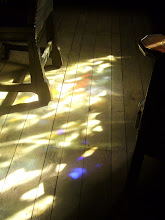Nothing. You've already told her twice."
This was the ignorant joke told by a co-worker of mine at which I did not laugh, or even crack a smile.--I stared, pointedly. This, of course, prompted him to go on and on about how he wasn't a woman-abuser and his wife was the person in charge in his house, and he was just joking around for irony's sake, etc. etc. etc.
When he finished this long-winded attempt at an apology, I asked, "Would you tell a racist joke? It's the same thing." It is incredible to me how intelligent, morally concerned people can make jokes about subjects that are unquestionably not funny. I know it's because people don't realize how powerful language is--how it shapes our culture, our attitudes, our beliefs. Our entire existence is framed in language; whether we realize it or not, language constitutes our world as we know it. It is a more effective tool of oppression than any gun or tank or fist.
Someone very close and dear to me was recently abused by her child's father--I couldn't laugh at that, so I surely can't laugh at a joke about beating a woman. I tried to explain to my coworker that telling jokes about abusing women is aiding the oppression and violence that women experience every day around the world. A joke like this perpetuates the idea that it is okay to abuse women, that the abuse women undergo isn't as disgusting and horrific as other crimes--genocide, torture, child molesting...who could laugh at those?
Yet why laugh at the idea of a woman being struck by a fist? Where is the humor in that? Unfortunately, men are not the only guilty ones in the oppression of women, in their abuse and degradation. Women, too, are guilty.
I cringe when I hear women use words like bitch or pussy in reference to themselves or others--not because the language is vulgar, but because I know that it is language like that that makes woman a second-class citizen. To call a man a pussy is to calm him weak, cowardly, womanly. Less than. Women have often been as eager to align themselves with patriarchal culture as the men have wanted them to be--either by making themselves the doormat of men or by trying to become as much like men as possible. Today a woman tried to convince me that men have a more difficult time in life than women these days, that they have been "castrated" by the theft of the breadwinner role, relegated to an uncertain role of manhood. I wanted to scream at her, "Finally, the oppressive system is being broken down, the emperor removed from his tyrannical throne, and you would rebuild it, you would put him back to the place of god, and woman to the place of his slave?" It is absolutely enraging.
True, women have won significant gains in education and in many professions; we have all the same legal rights as men; we can be ministers in many churches, work in any field we choose; decide whether we want to marry or not, have children or not. But I cannot walk down the street alone by myself without feeling the need to look behind my shoulder, to keep a sharp eye out. I have to check my backseat before getting into my car after pumping gas. If I had a daughter I would live in terror at the thought of her molestation, her rape. So are the sexes equal? No. The poet and feminist critic Adrienne Rich said famously, "I am a feminist because I feel endangered, psychically and physically, by this society and because I believe that the women's movement is saying that we have come to an edge of history when men - insofar as they are embodiments of the patriarchal idea - have become dangerous to children and other living things, themselves included."
After I pulled out the best of my literary and feminist theory thought for the education of my ignorant co-worker, he (to his credit) responded with a sincere, "I've never thought about that before. I never realized it was that way." And my heart was glad. Surely my education has not gone to waste, my passions are not for naught; you really can change the world, even with a head full of literary theory.
Centered in God, Not in Ourselves
9 years ago

